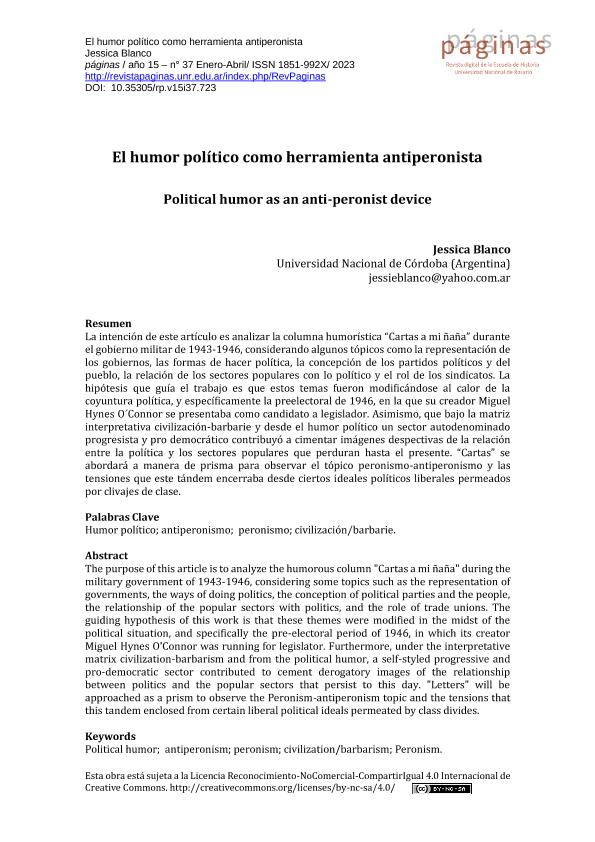Mostrar el registro sencillo del ítem
dc.contributor.author
Blanco, Jessica

dc.date.available
2024-02-08T12:33:45Z
dc.date.issued
2023-01
dc.identifier.citation
Blanco, Jessica; El humor político como herramienta antiperonista; Universidad Nacional de Rosario; Páginas; 15; 37; 1-2023; 1-20
dc.identifier.uri
http://hdl.handle.net/11336/226322
dc.description.abstract
La intención de este artículo es analizar la columna humorística "Cartas a mi ñaña" durante el gobierno militar de 1943-1946, considerando algunos tópicos como la representación de los gobiernos, las formas de hacer política, la concepción de los partidos políticos y del pueblo, la relación de los sectores populares con lo político y el rol de los sindicatos. La hipótesis que guía el trabajo es que estos temas fueron modificándose al calor de la coyuntura política, y específicamente la preelectoral de 1946, en la que su creador se presentaba como candidato a legislador. Asimismo, que bajo la matriz interpretativa civilización-barbarie y desde el humor político un sector autodenominado progresista y pro democrático contribuyó a cimentar imágenes despectivas de la relación entre la política y los sectores populares que perduran hasta el presente. “Cartas” se abordará a manera de prisma para observar el tópico peronismo-antiperonismo y las tensiones que este tándem encerraba desde ciertos ideales políticos liberales permeados por clivajes de clase.
dc.description.abstract
The purpose of this article is to analyze the humorous column "Cartas a mi ñaña" during the military government of 1943-1946, considering some topics such as the representation of governments, the ways of doing politics, the conception of political parties and the people, the relationship of the popular sectors with politics, and the role of trade unions. The guiding hypothesis of this work is that these themes were modified in the midst of the political situation, and specifically the pre-electoral period of 1946, in which its creator Miguel Hynes O'Connor was running for legislator. Furthermore, under the interpretative matrix civilization-barbarism and from the political humor, a self-styled progressive and pro-democratic sector contributed to cement derogatory images of the relationship between politics and the popular sectors that persist to this day. "Letters" will be approached as a prism to observe the Peronism-antiperonism topic and the tensions that this tandem enclosed from certain liberal political ideals permeated by class divides.
dc.format
application/pdf
dc.language.iso
spa
dc.publisher
Universidad Nacional de Rosario

dc.rights
info:eu-repo/semantics/openAccess
dc.rights.uri
https://creativecommons.org/licenses/by-nc-nd/2.5/ar/
dc.subject
HUMOR POLÍTICO
dc.subject
ANTIPERONISMO
dc.subject
PERONISMO
dc.subject
CIVILIZACIÓN/BARBARIE
dc.subject.classification
Historia

dc.subject.classification
Historia y Arqueología

dc.subject.classification
HUMANIDADES

dc.title
El humor político como herramienta antiperonista
dc.title
Political humor as an anti-peronist device
dc.type
info:eu-repo/semantics/article
dc.type
info:ar-repo/semantics/artículo
dc.type
info:eu-repo/semantics/publishedVersion
dc.date.updated
2024-02-08T10:36:41Z
dc.identifier.eissn
1851-992X
dc.journal.volume
15
dc.journal.number
37
dc.journal.pagination
1-20
dc.journal.pais
Argentina

dc.journal.ciudad
Rosario
dc.description.fil
Fil: Blanco, Jessica. Consejo Nacional de Investigaciones Científicas y Técnicas. Centro Científico Tecnológico Conicet - Córdoba. Instituto de Humanidades. Universidad Nacional de Córdoba. Instituto de Humanidades; Argentina
dc.journal.title
Páginas

dc.relation.alternativeid
info:eu-repo/semantics/altIdentifier/url/https://revistapaginas.unr.edu.ar/index.php/RevPaginas/article/view/726
Archivos asociados
